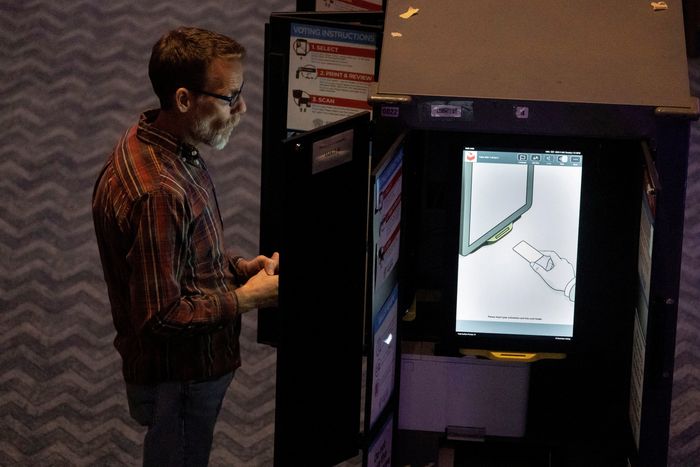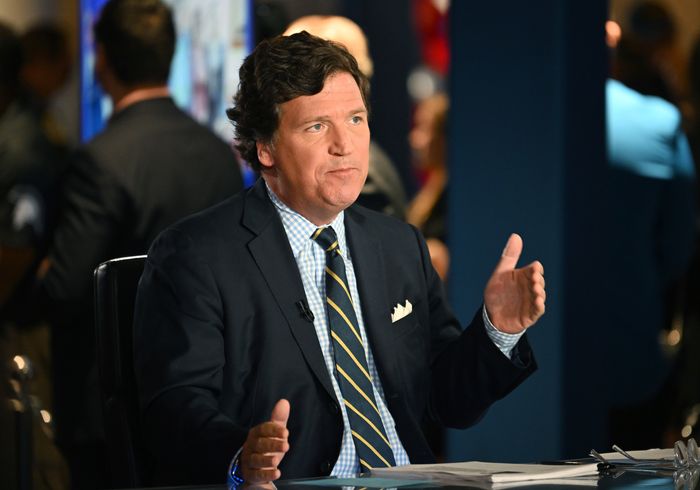Fox News Defamation Trial Delayed Amid Network’s Push to Settle Dispute
A Delaware judge delayed the start of the eagerly anticipated trial on a voting-machine company’s defamation claims against Fox News, an announcement that came as the network is looking for a possible way to settle the case.
Superior Court Judge Eric Davis said late Sunday that he was delaying the start of the trial by one day, moving it from Monday to Tuesday. He didn’t explain the reasons for the move.
Fox has made a late push to settle the dispute with Dominion Voting Systems out of court, people familiar with the situation said Sunday.
Dominion has been seeking $1.6 billion in damages but appears to have softened its claims. An April 14 email from Dominion to Fox, attached to a new Fox legal filing on Sunday, indicated that Dominion wouldn’t present a jury with claims for alleged lost profits. In its original 2021 lawsuit, Dominion sought lost-profits damages of not less than $600 million.
Dominion had no immediate comment on the Fox filing. Both sides declined to comment on the judge’s delay.
If the case isn’t resolved out of court, a jury will decide a once in a generation defamation case that could have broad ramifications for the network and test the contours of modern media law. The proceedings are scheduled to last about six weeks.
Dominion has accused Fox News, a unit of Fox Corp. , of airing false claims by hosts and guests that Dominion helped rig the outcome of the 2020 U.S. presidential election in favor of Joe Biden. It is seeking damages for alleged financial harm to the company, arguing that Fox News and Fox Business egregiously departed from journalistic norms by broadcasting stolen-election segments they knew or should have known were false.
Fox has sought to position its actions and election coverage as within the mainstream: reporting on allegations from then-President Donald Trump and his associates that were newsworthy. But it has been on the losing end of a series of pretrial rulings in recent months.
The release of internal Fox communications during the litigation shows that network executives and hosts were skeptical of election-fraud claims, but also concerned about alienating viewers who supported Mr. Trump.
“In some ways, it’s just another piece of litigation for a large dollar amount, but it’s also unlike any case you’ve seen before, weighing the future of Fox News, what’s permissible for what a reporter can trust, and the future of faith in the media,” said Victoria Baranetsky, general counsel at the Center for Investigative Reporting. “In those ways, the stakes are high.”

A voter in Atlanta using a Dominion voting machine in the 2022 midterm election last fall.
Photo: CARLOS BARRIA/REUTERS
Media organizations enjoy robust protections under the First Amendment, making defamation cases difficult for plaintiffs to win. Most lawsuits don’t even make it to trial, prompting some to argue that modern precedent makes it too difficult for businesses or individuals to vindicate their reputations in court.
Legal observers say the Dominion case could prove to be a notable counterexample. The company has come to the eve of trial riding momentum: Judge Davis has already concluded that Fox News and Fox Business did in fact broadcast false claims about Dominion, voiced by both network hosts and Trump associates, including Sidney Powell and Rudy Giuliani, who appeared as guests.
The judge has also said Fox had a credibility problem and questioned whether the company failed to provide required disclosures and information in the litigation. Fox denies wrongdoing.
If the trial moves forward, it will be up to a jury to decide whether Fox acted with “actual malice” in broadcasting false claims, a standard that turns on whether Dominion can prove that Fox knowingly published false information or proceeded with a reckless disregard for the truth.
Dominion says it has enough evidence to meet this bar. It says text and email communications from Fox executives and hosts—in some instances mocking claims made on air by guests or openly worrying about losing viewers to other networks embracing a harder line—show they knew the information wasn’t true but continued to air the false claims.
Photos: What Fox News Insiders Said Privately About Election-Fraud Claims
Not long after the election, Fox News prime-time host Tucker Carlson wrote to his producer that “Sidney Powell is lying” about having evidence of election fraud, according to a court filing. He wrote a similar message to fellow anchor Laura Ingraham. “It’s unbelievably offensive to me. Our viewers are good people and they believe it,” Mr. Carlson wrote.
Fox Corp. Chair Rupert Murdoch, who is expected to be called to testify, acknowledged in a deposition that some Fox hosts and commentators endorsed the false election-fraud narrative but said the company itself didn’t. “I would have liked us to be stronger in denouncing it, in hindsight,” Mr. Murdoch said.
Other high-profile witnesses who could be called to testify at the trial include Fox hosts Sean Hannity, Maria Bartiromo and Mr. Carlson.
Fox Corp., which is also a defendant in this case, shares common ownership with News Corp, parent of The Wall Street Journal’s publisher, Dow Jones & Co.
A Fox spokeswoman said in a statement that Dominion had pushed “irrelevant and misleading information to generate headlines,” and called the lawsuit “a political crusade in search of a financial windfall, but the real cost would be cherished First Amendment rights.”
In a statement, Dominion said: “The First Amendment does not shield broadcasters that knowingly or recklessly spread lies.” The company says it was defamed by hosts or their guests on 17 programs that ran on Fox News and Fox Business between Nov. 8, 2020, and Jan. 26, 2021, as well as three tweets by then-host Lou Dobbs.
Fox News and Fox Business are the largest profit engines of Fox Corp., accounting for about 70% of its earnings before interest, taxes, depreciation and amortization, according to Wells Fargo.
Longtime defamation attorney Lee Levine said the jury’s decision ultimately won’t pose an existential threat to Fox Corp. “Frankly, I don’t think it will change much about the way Fox does business,” Mr. Levine said.

Tucker Carlson is among the Fox hosts who could be called to testify at trial.
Photo: Jason Koerner/Getty Images
Wall Street analysts said that while Fox could absorb a substantial financial penalty, that might limit its flexibility to engage in share buybacks. “They can afford it, but of course there’s other things that they’d rather do with that cash,” said Joseph Bonner, a senior analyst at Argus Research.
Fox had just over $4 billion in cash when it last reported quarterly earnings back in February. At the time, it authorized a new $3 billion stock-buyback plan, bringing its total authorized repurchases to $7 billion.
Doug Arthur, an analyst at Huber Research, said it was highly unlikely that Fox would be asked to pay the full $1.6 billion in damages in the event of a loss.
Dominion argued in court documents that the $1.6 billion request was to compensate for damage to its reputation that led to lost profits and diminished business value.
Lawyers for Fox have argued that Dominion’s claims for damages are unreasonable and that its business hasn’t been significantly harmed by the election-fraud allegations, saying the company has retained many of its customers.
Fox also faces a $2.7 billion defamation suit from Smartmatic USA Corp., another voting-machine company, over similar claims, and recently settled a defamation lawsuit brought by a Venezuelan businessman who alleged that he was falsely accused of having helped rig the 2020 U.S. presidential election.
SHARE YOUR THOUGHTS
What do you think will be the outcome of Dominion Voting Systems’ defamation case against Fox News? Join the conversation below.
Six years ago, a closely watched defamation case against ABC News made it to trial but was settled before jurors had a chance to weigh in. Network parent Walt Disney Co. paid an undisclosed amount to resolve defamation claims by Beef Products Inc. over a 2012 series of stories the network aired about its processed-meat product, which critics had called “pink slime.”
A Disney financial disclosure suggested the company paid at least $177 million to end the case.
Last year, a federal judge rejected Sarah Palin’s allegations that she was defamed by a New York Times editorial, ruling that the former Republican vice-presidential candidate’s claims presented at trial were insufficient to prove her case. Jurors in the case also concluded that the Times didn’t defame Ms. Palin.
Also last year, two separate juries rendered defamation judgments that totaled more than a $1 billion against conspiracy theorist Alex Jones, who claimed on his InfoWars platform that the 2012 Sandy Hook school massacre was a hoax.
None of these cases offers a direct parallel to the Fox litigation, media-law specialists said.
“This is an especially unique jury case because of the scope and scale,” said RonNell Andersen Jones, a law professor at the University of Utah. There are no comparable examples of jury trials about “an allegation from a plaintiff that there was a conscious corporate decision to repeatedly tell a defamatory lie,” she said.
Write to Erin Mulvaney at erin.mulvaney@wsj.com, Isabella Simonetti at isabella.simonetti@wsj.com and Joe Flint at Joe.Flint@wsj.com
This article has been archived for your research. The original version from The Wall Street Journal can be found here.


